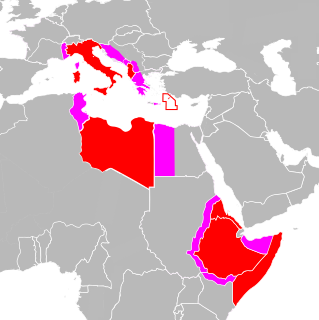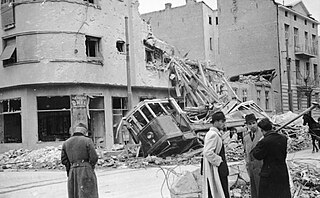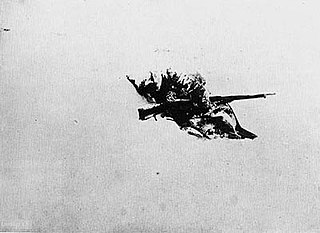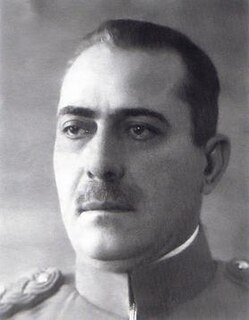Related Research Articles

The Central Powers, also Central Empires, consisting of Germany, Austria-Hungary, the Ottoman Empire and Bulgaria - hence also known as the Quadruple Alliance —was one of the two main coalitions that fought World War I (1914–18).

World War II, also known as the Second World War, was a global war that lasted from 1939 to 1945. The vast majority of the world's countries—including all the great powers—eventually formed two opposing military alliances: the Allies and the Axis. A state of total war emerged, directly involving more than 100 million people from more than 30 countries. The major participants threw their entire economic, industrial, and scientific capabilities behind the war effort, blurring the distinction between civilian and military resources. World War II was the deadliest conflict in human history, marked by 70 to 85 million fatalities, most of whom were civilians in the Soviet Union and China. It included massacres, genocides, strategic bombing, premeditated death from starvation and disease, and the only use of nuclear weapons in war.

The Axis powers, also known as "Rome–Berlin–Tokyo Axis" were the nations that fought in World War II against the Allies. The Axis powers agreed on their opposition to the Allies, but did not completely coordinate their activity.

An alliance is a relationship among people, groups, or states that have joined together for mutual benefit or to achieve some common purpose, whether or not explicit agreement has been worked out among them. Members of an alliance are called allies. Alliances form in many settings, including political alliances, military alliances, and business alliances. When the term is used in the context of war or armed struggle, such associations may also be called allied powers, especially when discussing World War I or World War II.

The participation of Italy in the Second World War was characterized by a complex framework of ideology, politics, and diplomacy, while its military actions were often heavily influenced by external factors. Italy joined the war as one of the Axis Powers in 1940, as the French Third Republic surrendered, with a plan to concentrate Italian forces on a major offensive against the British Empire in Africa and the Middle East, while expecting the collapse of British forces in the European theatre. The Italians bombed Mandatory Palestine, invaded Egypt and occupied British Somaliland with initial success. However, German and Japanese actions in 1941 led to the entry of the Soviet Union and United States, respectively, into the war, thus ruining the Italian plan of forcing Britain to agree to a negotiated peace settlement.

Anton Ludwig Friedrich August von Mackensen, born August Mackensen, was a German field marshal. He commanded successfully during the First World War and became one of the German Empire's most prominent and competent military leaders. After the armistice, Mackensen was interned for a year. He retired from the army in 1920 and was made a Prussia state councillor in 1933 by Hermann Göring. During the Nazi era, Mackensen remained a committed monarchist and sometimes appeared at official functions in his First World War uniform. He was suspected of disloyalty to the Third Reich, but nothing was proven against him.

The Balkans campaign of World War II began with the Italian invasion of Greece on 28 October 1940. In the early months of 1941, Italy's offensive had stalled and a Greek counter-offensive pushed into Albania. Germany sought to aid Italy by deploying troops to Romania and Bulgaria and attacking Greece from the east. Meanwhile, the British landed troops and aircraft to shore up Greek defences. A coup d'état in Yugoslavia on 27 March caused Adolf Hitler to order the conquest of that country.
Icebreaker: Who Started the Second World War? is a military history book by Viktor Suvorov, first published in Russian in 1987. Suvorov argued that Stalin planned a conquest of Europe for many years and was preparing to launch a surprise attack of Nazi Germany at the end of summer of 1941 in order to begin this plan. He says that Operation Barbarossa was a preemptive strike by Hitler, which the Nazi leader had argued. Since the 1990s and the dissolution of the Soviet Union, this theory has received some support among historians in some post-Soviet and Central European states, but Western scholars have criticized his conclusions for lack of evidence and documentation.

The Allies of World War II, called the United Nations from the 1 January 1942 declaration, were the countries that together opposed the Axis powers during the Second World War (1939–1945). The Allies promoted the alliance as a means to control German, Japanese and Italian aggression.

The Allies of World War I or Entente Powers were the coalition that opposed the Central Powers of Germany, Austria–Hungary, the Ottoman Empire, and Bulgaria during the First World War (1914–1918).

Operation Retribution, also known as Operation Punishment, was the April 1941 German bombing of Belgrade, the capital of Yugoslavia, in retaliation for the coup d'état that overthrew the government that had signed the Tripartite Pact. The bombing occurred in the first days of the German-led Axis invasion of Yugoslavia during World War II. The Royal Yugoslav Army Air Force (VVKJ) had only 77 modern fighter aircraft available to defend Belgrade against the hundreds of German fighters and bombers that struck in the first wave early on 6 April. Three days prior, VVKJ Major Vladimir Kren had defected to the Germans, disclosing the locations of multiple military assets and divulging the VVKJ's codes.

The Balkans theatre, or Balkan campaign, of World War I was fought between the Central Powers and the Allies.

The Serbian Campaign refers to the campaigns launched against Serbia at the beginning of the First World War. The first campaign began after Austria Hungary declared war on Serbia on 28 July 1914, the campaign to "punish" Serbia, under the command of Austrian Oskar Potiorek, ended after three unsuccessful Austro-Hungarian invasion attempts were repelled by the Serbs and their Montenegrin allies. Serbia’s defeat of the Austro-Hungarian invasion of 1914 ranks as one of the great upsets of modern military history.

World War I, also known as the First World War or the Great War, was a global war that lasted from 1914 to 1918. Contemporaneously described as "the war to end all wars", it led to the mobilisation of more than 70
The military history of Europe refers to the history of warfare on the European continent. From the beginning of the modern era to the second half of the 20th century, European militaries possessed a significant technological advantage, allowing its states to pursue policies of expansionism and colonization until the Cold War period. European militaries in between the fifteenth century and the modern period were able to conquer or subjugate almost every other nation in the world. Since the end of the Cold War, the European security environment has been characterized by structural dominance of the United States through its NATO commitments to the defense of Europe, as European states have sought to reap the 'peace dividend' occasioned by the end of the Cold War and reduce defense expenditures. European militaries now mostly undertake power projection missions outside the European continent. Recent military conflicts involving European nations include the 2001 War in Afghanistan, the 2003 War in Iraq, the 2011 NATO Campaign in Libya, and various other engagements in the Balkan and on the African continent. After 2014, the Russian annexation of Crimea and ongoing crisis in Ukraine prompted renewed scholarly interest into European military affairs.

Military operations in World War II in Yugoslavia began on 6 April 1941, when the Kingdom of Yugoslavia was swiftly conquered by Axis forces and partitioned between Germany, Italy, Hungary, Bulgaria and client regimes. Subsequently, a guerrilla liberation war was fought against the Axis occupying forces and their locally established puppet regimes, including the fascist Independent State of Croatia and the Government of National Salvation in the German-occupied territory of Serbia, by the Communist-led republican Yugoslav Partisans. Simultaneously, a multi-side civil war was waged between the Yugoslav communist Partisans, the Serbian royalist Chetniks, the Croatian fascist Ustashe and Home Guard, Serbian Volunteer Corps and State Guard, as well as Slovene Home Guard troops.

The Kingdom of Bulgaria participated in World War I on the side of the Central Powers from 14 October 1915, when the country declared war on Serbia, until 30 September 1918, when the Armistice of Thessalonica came into effect.
The following outline is provided as an overview of and topical guide to World War II:

Milorad Petrović was an Armijski đeneral in the Royal Yugoslav Army who commanded the 1st Army Group during the April 1941 German-led Axis invasion of Yugoslavia of World War II. Petrović was commissioned into the Royal Serbian Army in 1901, and served in staff positions during the Balkan Wars. During World War I he served in various staff roles at army and divisional level during the Serbian Campaign and later on the Macedonian front. After the war ended he participated in military operations along the disputed northern border of the nascent Kingdom of Serbs, Croats and Slovenes. During the interwar period, Petrović was steadily promoted, performing key roles at the Ministry of the Army and Navy and reaching the rank of armijski đeneral in 1937. At the time of the 27 March 1941 Yugoslav coup d'état, he was the military commander of the Yugoslav capital, Belgrade.

Svetolik Dragačevac was a retired Serbian law enforcement official who sent a threatening typewritten letter to German dictator Adolf Hitler on the eve of the Axis invasion of Yugoslavia in late March 1941.
References
- ↑ Axworthy, Mark (12 October 2006). "Germany and the Axis Powers: From Coalition to Collapse (review)". The Journal of Military History. 70 (4): 1157–1158. doi:10.1353/jmh.2006.0217. ISSN 1543-7795.
- ↑ Scudieri, James D. (22 September 2016). "Invasion: The Conquest of Serbia, 1915". Parameters. 46 (3): 133. ISSN 0031-1723.